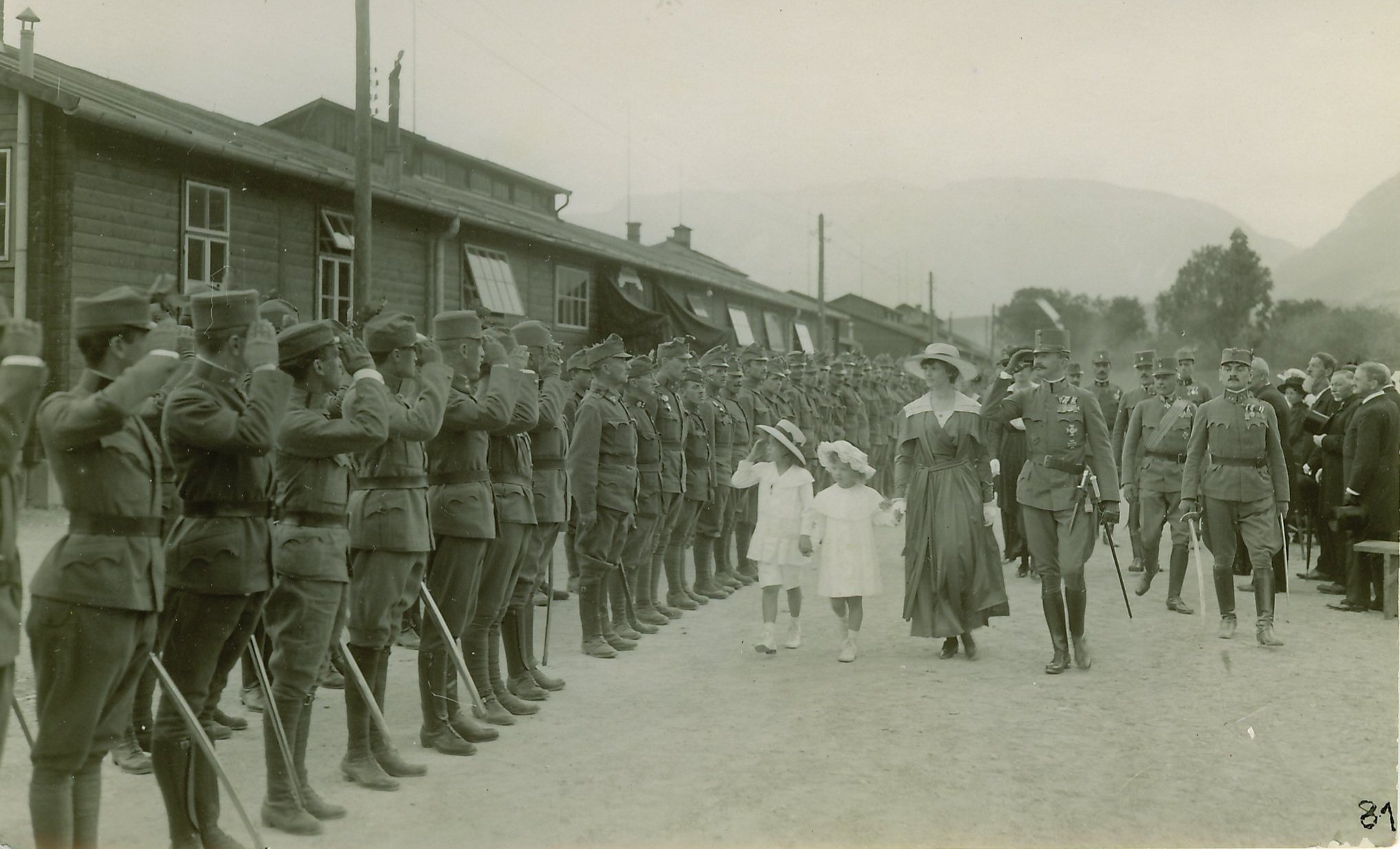
Karl: A Resolute Peacemaker
From the very beginning of his reign, Karl worked to create peace for his empire. He had been against the declaration of war, and now he was in a position to put an end to the needless killing and fighting. In his accession speech he proclaimed: "I will do all within my power to banish the horrors and sacrifices of war at the earliest possible date and to win back for my peoples the sorely missed blessings of peace . . ."
Emperor Karl's deepest desire was to end the killing and suffering brought on by the First World War. As an archduke and military man, he saw first hand the killing and mutilations created on the battlefields of the various fronts. As Emperor, he saw the suffering and starving of his people during his visits to various cities, towns, and villages throughout his empire. As hereditary monarch, he foresaw the impending doom for his dynasty from numerous revolutionaries.
Karl tried to enter into secret negotiations with the Entente Powers. His brotherin- laws, Prince Sixtus of Bourbon-Parma and Prince Xavier of Bourbon-Parma, who were serving in the military on the Entente side, acted as intermediaries between the Emperor and the French and English leaders. The princes were secretly smuggled into Austria, so they could discuss with Emperor Karl possible solutions to the war. As a result of their discussions, the Emperor wrote a confidential lettered addressed to Prince Sixtus, which could be shown to the Entente Powers to indicate Karl's good faith to negotiate a peace, and willingness to help lead his German ally to the peace table. He ended the letter stating: "Hoping that in this way we shall soon be able, on both sides, to put an end to the suffering of so many millions of men and of so many families that live in sorrow and anxiety."
Because the success of this attempt relied totally on its confidentiality, a great scandal occurred when a dispute between the Austrian Foreign Minister Count Ottokar Czernin and the new French leadership occurred. The contents of the letter were reveled, and during the subsequent accusations and denials by the various ministers, Karl's influence on his allies was compromised and his standing with the Entente as a realistic instrument for peace was ruined. The peace initiative collapsed, the war was prolonged, and some of the bloodiest days of fighting occurred, resulting in the loss of over two million more lives.
Although the "Sixtus Affair" ended peace negotiations through his brother-in-law, Emperor Karl did not stop his pursuit of peace. He made it clear that his sole intention was to end the war as quickly as possible, and because he was not one of the original belligerents he was the ideal person to bring the war to an end. During the second half of his reign, he ordered negotiations to continue. This time the talks were in Switzerland, and between Count Czernin for Austria-Hungary and Count Armand for the French. The talks continued to almost the very end of the war, but the discussions unfortunately came to nothing.
Another avenue of peace that Karl supported was Pope Benedict XV's peace proposal. Karl accepted the proposal unconditionally. Responding in a letter dated August 1, 1917, he wrote to the Pope that from the earliest days of his reign he sought peace. He continued:
. . . we expressed the hope for Austria-Hungary to find a peace that will free the future lives of people from rancor and revenge, so as to protect generations to come from the use of arms. In the meantime, our government has not stopped repeating our continual call for peace-a call heard by the entire world-expressing the desire and agreement of the people of the Austro-Hungarian monarchy to put an end to the bloodshed according to the peace plan that Your Holiness has before you.
However, the other belligerents flatly rejected it because the plan basically reestablished pre-war borders. The other combatants wanted the war to continue for their own selfish purposes. The Italians wanted the war to continue because the Entente promised them any Austrian territory they occupied at war's end-and the Italians did not occupy any promised territory. The French wanted the war to continue so that they would be winning at war's end and able to punish Germany, and take Alsace-Lorraine from them. The English also wanted to be in a dominant position at the conclusion of the war in order to better negotiate terms. Finally, because the Germans were winning the war at the time, they wanted it to continue so they could expand their territory even farther.
When the United States of America entered the war, the tide began to turn against the German and Austro-Hungarian Empires. When President Woodrow Wilson proposed his famous Fourteen Points, Emperor Karl accepted all the points unconditionally. The war might have ended then, but France and the United States surprisingly recognized a group of Bohemian refugees in Paris as a legitimate Czechoslovakian government in exile, rather than accepting Karl's compliance to Wilson's demands. The other ethnic groups and nationalities in the empire saw their chance at independence and began declaring their separation from the Austro-Hungarian Empire. France and the United States encouraged them, and it soon became clear that the Empire was being dismantled from within and without-with nothing Karl could do to halt the process.
It is uncontestable that Karl tried everything in his power to bring peace to his empire and to Europe. Even writers from his enemy combatants recognized this trait. The French novelist and satirist, Anatole France, wrote:
Emperor Karl is the only decent man to come out of the war in a leadership position, yet he was a saint and no one listened to him. He sincerely wanted peace, and therefore was despised by the whole world. It was a wonderful chance that was lost.
Herbert Vivian, an English writer, wrote later in life about his meeting with the Emperor:
Karl was a great leader, a prince of peace, who wanted to save the world from a year of war; a statesman with ideas to save his people from the complicated problems of his empire; a king who loved his people, a fearless man, a noble soul, distinguished, a saint from whose grave blessings come.
Text by Br. Nathan Cochran, OSB

